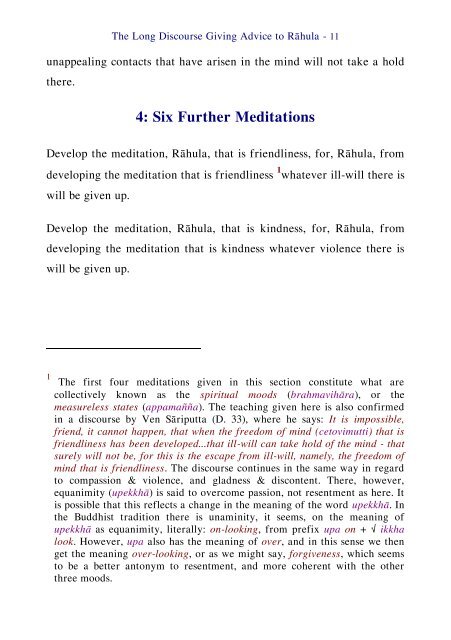The Long Discourse Giving Advice to Rāhula
An English translation of this discourse the Buddha gave to his son on the development of meditation (MahāRāhulovādasutta, Majjhimanikāya 62)
An English translation of this discourse the Buddha gave to his son on the development of meditation (MahāRāhulovādasutta, Majjhimanikāya 62)
Create successful ePaper yourself
Turn your PDF publications into a flip-book with our unique Google optimized e-Paper software.
<strong>The</strong> <strong>Long</strong> <strong>Discourse</strong> <strong>Giving</strong> <strong>Advice</strong> <strong>to</strong> <strong>Rāhula</strong> - 11<br />
unappealing contacts that have arisen in the mind will not take a hold<br />
there.<br />
4: Six Further Meditations<br />
Develop the meditation, <strong>Rāhula</strong>, that is friendliness, for, <strong>Rāhula</strong>, from<br />
developing the meditation that is friendliness 1 whatever ill-will there is<br />
will be given up.<br />
Develop the meditation, <strong>Rāhula</strong>, that is kindness, for, <strong>Rāhula</strong>, from<br />
developing the meditation that is kindness whatever violence there is<br />
will be given up.<br />
1 <strong>The</strong> first four meditations given in this section constitute what are<br />
collectively known as the spiritual moods (brahmavihāra), or the<br />
measureless states (appamañña). <strong>The</strong> teaching given here is also confirmed<br />
in a discourse by Ven Sāriputta (D. 33), where he says: It is impossible,<br />
friend, it cannot happen, that when the freedom of mind (ce<strong>to</strong>vimutti) that is<br />
friendliness has been developed...that ill-will can take hold of the mind - that<br />
surely will not be, for this is the escape from ill-will, namely, the freedom of<br />
mind that is friendliness. <strong>The</strong> discourse continues in the same way in regard<br />
<strong>to</strong> compassion & violence, and gladness & discontent. <strong>The</strong>re, however,<br />
equanimity (upekkhā) is said <strong>to</strong> overcome passion, not resentment as here. It<br />
is possible that this reflects a change in the meaning of the word upekkhā. In<br />
the Buddhist tradition there is unaminity, it seems, on the meaning of<br />
upekkhā as equanimity, literally: on-looking, from prefix upa on + √ ikkha<br />
look. However, upa also has the meaning of over, and in this sense we then<br />
get the meaning over-looking, or as we might say, forgiveness, which seems<br />
<strong>to</strong> be a better an<strong>to</strong>nym <strong>to</strong> resentment, and more coherent with the other<br />
three moods.


















